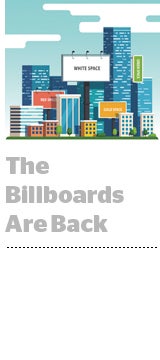Many brands quickly pulled out-of-home (OOH) campaigns when the country went into lockdown in March. After all, nobody would be outside to see them.
That claw back sent OOH prices plummeting across the market. And now that parts of the country are open again, OOH is a steal.
In May, direct-to-consumer men’s grooming brand Manscaped bought the largest digital billboard in the country, overlooking the heavily-trafficked Santa Monica Freeway in Los Angeles, for less than half of what it cost in February, said senior director of marketing Joey Kovac.
“You’re seeing in some areas people are out and about, walking, biking and going to parks,” he said. “We’re trying to either find places that have high pedestrian traffic or the best deal.”
Manscaped is still doing business during the pandemic, so it’s important it keeps awareness high. In addition to LA, the company also recently bought OOH placements in Chicago’s Urban North neighborhood and in Williamsburg, Brooklyn, both areas with heavy pedestrian traffic and declining or flat COVID-19 cases.
“Out-of-home inventory is static, so these vendors are losing money,” Kovac said. “It makes sense to find discounts.”
OOH pricing has inched up slightly since March and April, but some premium placements are still up to 80% off, said Brian Rappaport, CEO of OOH agency Quan Media Group. Those discounts open up killer branding opportunities for marketers that know how to find them in the right locations.
Quan is helping its clients, including Manscaped, meal-kit company HelloFresh, online learning provider Skillshare and telehealth brand Ro, find heavily discounted OOH deals based on changes in foot and vehicular traffic in key markets. In New York City, for example, the agency can target digital bus shelters or LinkNYC Kiosks outside of restaurants that are open for outdoor dining at a steep discount.
“We can understand the changes in commuter and traffic patterns to cherry-pick inventory, or take advantage of a great opportunity that’s usually super expensive,” Rappaport said.
Quan evaluates inventory by balancing its location and the state of COVID-19 cases in that area with the discounted rate. Digital assets are easier to target and cancel if necessary, but some large branding opportunities are also available on static boards in areas of big cities with heavy pedestrian traffic.
“If there’s a wall in Boston Back Bay where there’s so much pedestrian traffic, and we’ve seen a nice [COVID-19] rebound, that’s 70% off, jump on it,” Rappaport said. “It’s low risk, high reward.”
But just because inventory is cheap, doesn’t mean it’s worth the investment. While the agency is doubling down on markets such as New York, it’s starting to pull back in areas in California, which is now back in lockdown.
“It’s important to focus on opportunistic deals in a city that’s doing well,” Rappaport said.
But because cases are rising and falling at different rates around the country, securing deals with flexible cancellation policies is key. Quan curates inventory for clients every two weeks and generally advises them to not sign up for a flight that’s longer than four weeks.
“We don’t know what will happen in the fall,” Rappaport said. “We make sure they’re protected if they need to take a step back.”
Manscaped plans to continue sourcing discounted OOH inventory, but will pay close attention to ongoing closures in certain states, Kovac said. The brand isn’t measuring whether the OOH campaigns are driving sales, but it’s keeping an eye on site traffic in markets where it’s running OOH and consumer reactions to its campaigns on social.
Rappaport expects OOH pricing to remain heavily discounted until people’s lives and commuting patterns return to pre-pandemic levels.
“Until there’s a vaccine we’re going to be in a buyers’ market,” Rappaport added.













